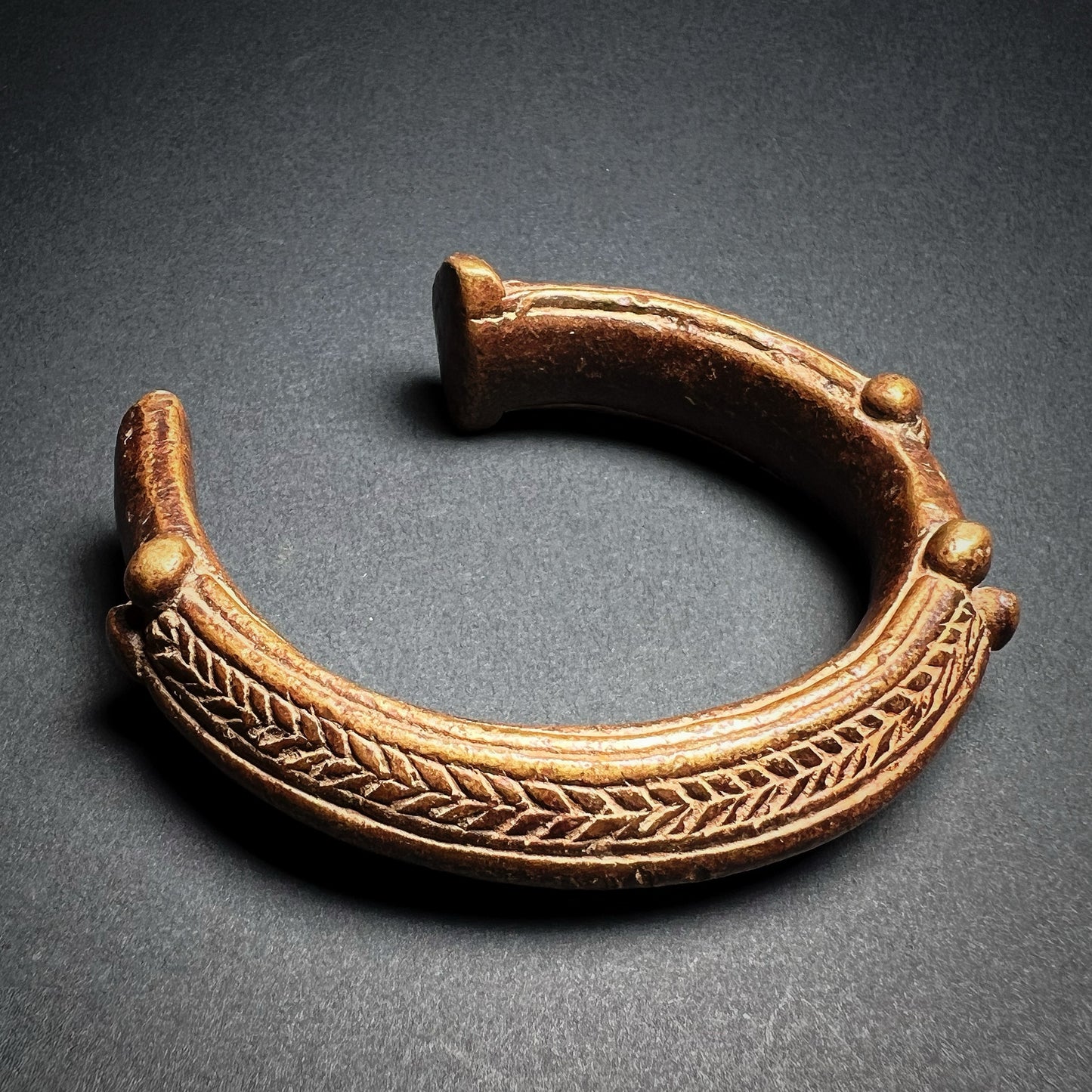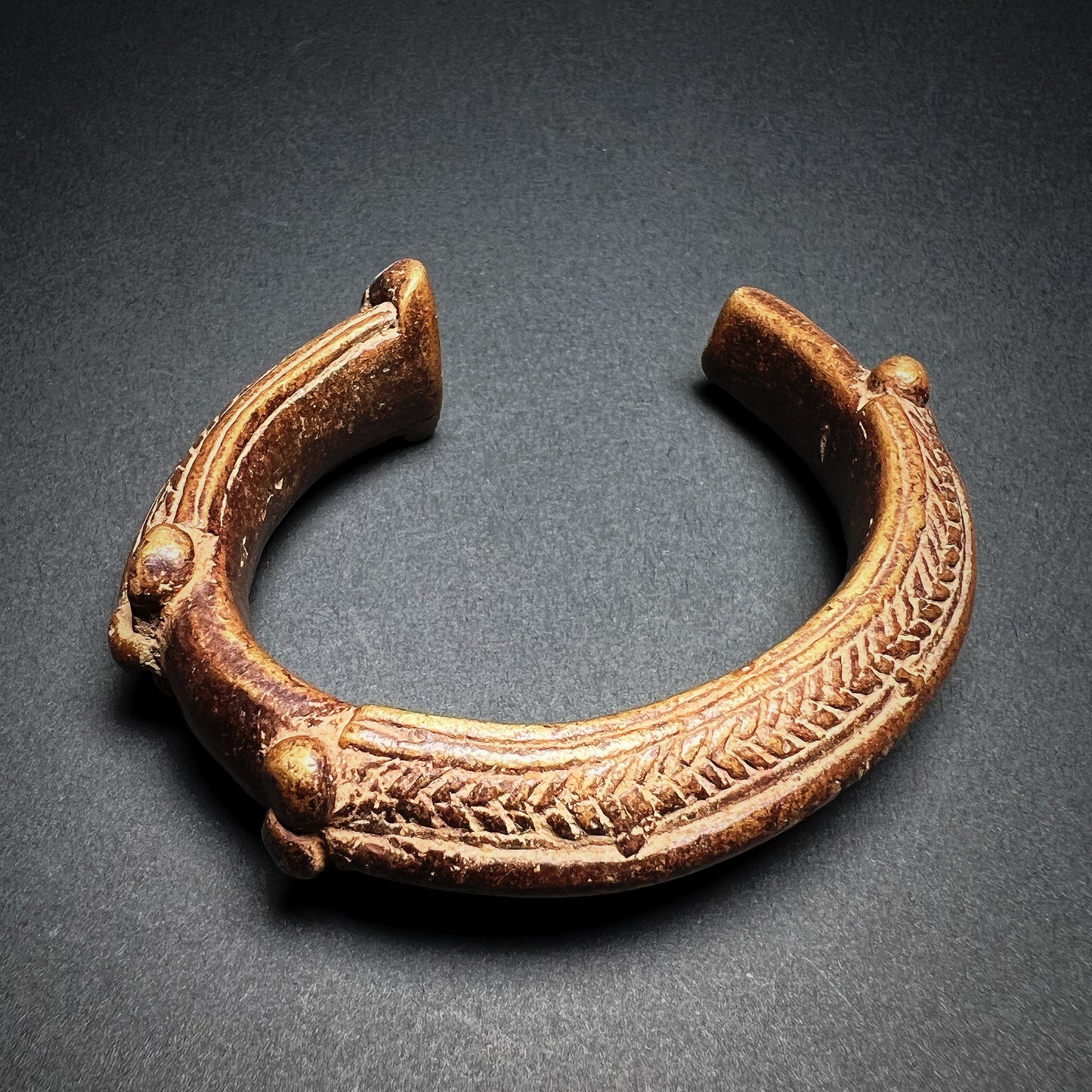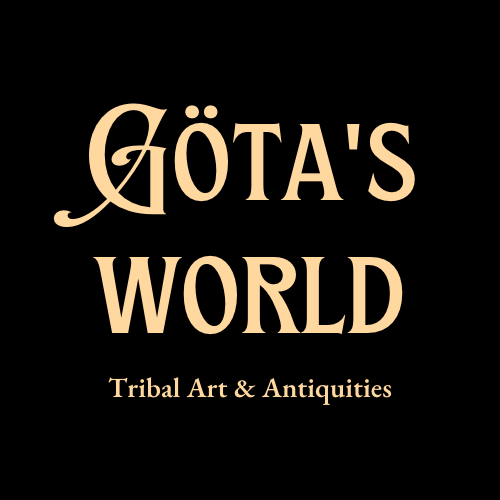Lobi Bronze Armlet Currency Manilla
Lobi Bronze Armlet Currency Manilla
Couldn't load pickup availability
The Lobi peoples, early to mid. 20th century, Burkina Faso, West Africa.
Fascinating and heavy Lobi bronze manilla was created using the lost wax method. Aged anklet or armlet is ornately embellished and divided into sections, each decorated with deeply carved panels and framed with pairs of raised ball-like adornments. Manillas are a form of commodity money, usually made of bronze or copper, which were used in West Africa. They were produced in large numbers in a wide range of designs, sizes, and weights. Originating before the colonial period, perhaps as the result of trade with the Portuguese Empire, Manillas continued to serve as money and decorative objects until the late 1940's and are still sometimes used as decoration. In popular culture, they are particularly associated with the Atlantic slave trade. The name manilla is said to derive from the Spanish for a "bracelet" manilla, the Portuguese for "hand-ring" (manilha), or after the Latin manus (hand) or from "monilia", plural of necklace (monile). They are usually horseshoe-shaped, with terminations that face each other and are roughly lozenge-shaped. The earliest use of manillas was in West Africa. As a means of exchange they originated in Calabar. Calabar was the chief city of the ancient southeast Nigerian coastal kingdom of that name. It was here in 1505 that a slave could be bought for 8-10 manillas, and an elephant’s tooth for one copper manilla. Africans of each region had names for each variety of manilla, probably varying locally. They valued them differently, and were very particular about the types they would accept.
The Lobi people live mainly in Burkina Faso, with smaller groups residing in Côte d’ivoire and Ghana. Lobi is a blanket term that refers to several closely related ethnic groups. The name Lobi originates from two Lobiri (the language spoken by Lobi people) words: ”lou” (forest) and ”bi” (children), meaning literally, ”children of the forest”. The Lobi are well documented for their animist beliefs. They believe that universe was created by a central almighty god (tangba or thangba yu), under which sit a number of deities (thila, singular thil). Under these thila are the other nature spirits, spirits of the bush (kontuossi or kontuorsi), after which human beings follow.
Good condition. Heavy wear consistent with age and use. Bent and missing parts. Lovely polished patina. Size approx. 7,9cm x 6,7cm x 1,8cm.
Provenance: Swedish private collection.
References and further reading:
The Teach Yourself Guide to Numismatics, C.C. Chamberlain, English Universities Press. 1963, p. 92.
The West African Manilla Currency: Research and Securing of Evidence from 1439-2019, Rolf Denk, Tredition GmbH, Hamburg, 2020.
Primitive Money in its ethnological, historical and economic aspects, Paul Einzig, Eyre & Spottiswoode, London, 1949.
Object biographies, Manilla or Penannular Bracelet Currency, Eric Edwards, Balfour Library, Pitt Rivers Museum, January 29th, 2010. (https://web.prm.ox.ac.uk/rpr/index.php/objectbiographies/78-manilla.html)
Occult Conversations, or How the Thila Make the Law for the Lobi, Claude-Henri Pirat, Arts d'Afrique,Voir l'Invisible, Musée d'Aquitaine, Bordeaux, Hazan, Paris, 2011, p. 85-91. and p. 217-220.
Anonyme Schnitzer der Lobi, Floros & Sigrid Katsouros/ Stephan & Petra Herkenhoff, Published by Hannover: Ethnographika, 2006.
Lobi, 101 Last Tribes. (https://www.101lasttribes.com/tribes/lobi.html)
Lobi Statuary and the Statuary of Related Peoples, an Example of Cult Art, Claude-Henri Pirat Tribal Arts Magazine, Paris/San Francisco, No:1, March 1994, p. 22-32.
Object biographies, Manilla or Penannular Bracelet Currency, Eric Edwards, Balfour Library, Pitt Rivers Museum, January 29th, 2010. (https://web.prm.ox.ac.uk/rpr/index.php/objectbiographies/78-manilla.html)


-
Shipping
The shipment will be prepared in the course of 3-5 days and dispatched via Posti Group Oyj or purchased item(s) can be picked up from our shop during the store's opening hours (Tarkk’ampujankatu 4, 00140, Helsinki, Finland). Within the Finland, all items are shipped via Posti Group Oyj unless otherwise requested. We pack the items carefully and mainly in recycled materials because we want to save nature. You will receive the tracking number for your items by e-mail.
-
Returns
Returns and exchange will be accepted within fourteen days (14) of receipt at the purchaser’s cost to include freight and packaging. Items must be returned in the same condition as when they were shipped, and will not be accepted if damaged or altered in any way. Please inform us via email (info@gotanmaailma.fi) or by calling +358408408352 before sending. We do not accept returns more than 14 days after delivery.


